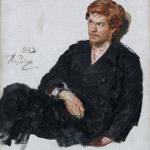Austen was a life-long Anglican, born to a C of E clergyman, with many C of E ministers in her extended family and ancestry and circle of acquaintances. Irene Collins notes, “Her maternal grandfather and her great uncle had been clergymen; so were her godfather, one of her uncles, two of her brothers and four of her cousins. Her sister became engaged to a clergyman and of the young men who are known or believed to have been Jane’s suitors three were clergy . . . . Jane’s published correspondence alone mentions over ninety clergymen with whom she was acquainted” ( Jane Austen, the Parson’s Daughter ).
To my knowledge, she never mentions Presbyterians either in her correspondence or her books, and I’m certain she wouldn’t have liked Presbyterian intensity any more than she liked Evangelical emotion. She does mention one prominent Presbyterian, though: Hugh Blair (1718-1800), who held a chair in Rhetoric at Edinburgh and was a leading figure in the Scottish Enlightenment.
What she made of Blair is hard to say, however. Collins says that Austen “learned what was meant by ‘taste’ in relation to preaching” from Hugh Blair, and that Blair also showed “how to distinguish proper feeling from embarrassing emotion.” I’m not so sure.
Elaine Bander writes, “Dr. Hugh Blair’s Rhetoric and Belles Lettres , first published in 1783, dominated schoolrooms for generations. Selections from Blair’s Rhetoric also formed the greatest part of Vicesimus Knox’s Elegant Extracts in Prose , a one-volume anthology published in 1794 to provide, prose models in English ‘for reading, writing . . . memorizing, reciting or declaiming’ (ii). At least one of these versions of Blair’s Rhetoric must have found its way into the Rectory at Steventon.”
Always an attentive reader and hearer of sermons, Austen certainly also knew of Blair’s five-volume collection of sermons. Mrs. Percival in Austen’s early unpublished work, Catherine (1792), despairs over the Catherine’s profligacy:
“All I wished for, was to breed you up virtuously; I never wanted you to play upon the Harpsichord, or draw better than any one else; but I had hoped to see you respectable and good; to see you able and willing to give an example of Modesty and Virtue to the Young people here abouts. I bought you Blair’s Sermons, and Coelebs in Search of a Wife, I gave you the key to my own Library, and borrowed many good books of my Neighbours for you, all to this purpose. But I might have spared myself the trouble – Oh! Catherine, you are an abandoned creature, and I do not know what will become of you.”
It’s apparent from Austen’s letters that she was less than enthusiastic about Hannah More’s Coelebs, and perhaps the reference to Blair’s sermons is equally ironic.
Years later, when Austen wrote the exchange between Edmund Bertram and Mary Crawford in Mansfield Park , she has Mary praise Blair’s eloquence. Mary dismisses Edmund’s claims for the importance of clergy, and make a passing allusion to Blair’s sermons:
” You assign greater consequence to the clergyman than one has been used to hear given, or than I can quite comprehend. One does not see much of this influence and importance in society, and how can it be acquired where they are so seldom seen themselves? How can two sermons a week, even supposing them worth hearing, supposing the preacher to have the sense to prefer Blair’s to his own, do all that you speak of? govern the conduct and fashion the manners of a large congregation for the rest of the week? One scarcely sees a clergyman out of his pulpit.”
Even this is far from straightforward. Mary is not a reliable guide, particularly in religious matters. Edmund, far more reliable on these matters, sharply contrasts the attractions of an eloquent city preacher to the humble example of a rural rector:
“A fine preacher is followed and admired; but it is not in fine preaching only that a good clergyman will be useful in his parish and his neighbourhood, where the parish and neighbourhood are of a size capable of knowing his private character, and observing his general conduct, which in London can rarely be the case. The clergy are lost there in the crowds of their parishioners. They are known to the largest part only as preachers. And with regard to their influencing public manners, Miss Crawford must not misunderstand me, or suppose I mean to call them the arbiters of good-breeding, the regulators of refinement and courtesy, the masters of the ceremonies of life. The manners I speak of might rather be called conduct , perhaps, the result of good principles; the effect, in short, of those doctrines which it is their duty to teach and recommend; and it will, I believe, be everywhere found, that as the clergy are, or are not what they ought to be, so are the rest of the nation.”
On the other hand, Henry Tilney’s sister mentions Blair in conjunction with Samuel Johnson, when she playfully rebukes her brother for overwhelming Catherine Morland with grammatical correctness:
“Henry,” said Miss Tilney, “you are very impertinent. Miss Morland, he is treating you exactly as he does his sister. He is forever finding fault with me, for some incorrectness of language, and now he is taking the same liberty with you. The word ‘nicest,’ as you used it, did not suit him; and you had better change it as soon as you can, or we shall be overpowered with Johnson and Blair all the rest
of the way.”
Here Blair is linked with Austen’s beloved Johnson, and “Blair” seems to be a trope for high-minded, morally sound eloquence. Johnson, moreover, approved of Blair’s sermons, and a story circulated that Johnson had persuaded the publisher Strahan to publish the sermons: “To say it is good is to say too little,” Johnson is reported to have said. If Austen knew that Johnson held the sermons in such high regard, it seems impossible that she would have dismissed them. Bander’s article (published in the Jane Austen Society of North America journal Persuasions in 1991, seems on the right track to see correlations between Blair’s ethics of rhetoric and Austen’s.















